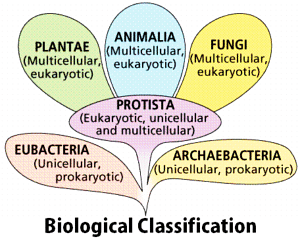Nuclear membrane is absent in
Show Hint
Prokaryotes are unicellular organisms that are not made up of cellulose. The cell organelles and well-defined nucleus are absent in these organisms.
- Monera
- Protista
- Fungi
- Plantae
The Correct Option is A
Solution and Explanation
Nuclear membrane is absent in Monera.
A moneran cell is microscopic and does not possess a well-defined nucleus. The genetic material is not enclosed in a cell nucleus, eg, in prokaryotes like archaebacteria and eubacteria. Other membrane-bound cell organelles like mitochondria, Golgi apparatus and chloroplast are also absent. Monera is unicellular, prokaryotic organism whose cell wall is not made up of cellulose. Cyanobacteria, mycoplasma are examples of Monera.
Also Read: Cell Organelles
Top Questions on biological classification
- Which of the following microorganisms is used in the production of curd from milk?
- MHT CET - 2025
- Biology
- biological classification
- In a DNA molecule, which of the following base-pairings is correct?
- MHT CET - 2025
- Biology
- biological classification
- Which is not a prime element?
- MHT CET - 2025
- Biology
- biological classification
- Study the following and choose the incorrect combinations:
I. Phylum: Porifera, Special cells: Lasso cells, Example: Spongilla
II. Phylum: Cnidaria, Special cells: Stinging cells, Example: Hydra
III. Phylum: Ctenophora, Special cells: Choanocytes, Example: Pleurobrachia
IV. Phylum: Platyhelminthes, Special cells: Flame cells, Example: Fasciola- TS EAMCET - 2025
- Zoology
- biological classification
- Study the following and choose the correct combinations:

- TS EAMCET - 2025
- Zoology
- biological classification
Questions Asked in AMUEEE exam
- The ratio of the half-life time $ (t_{1/2}) $ , to the three quarter life-time, $ (t_{3/4}) $ , for a reaction that is second order
- AMUEEE - 2018
- Order of Reaction
- $ 0.002\, M $ solution of a weak acid has an equivalent conductance $ (\wedge) 60\, ohm^{-1}\, cm^{2}\, eq^{-1} $ . What will be the $ pH $ ? (Given : $ \wedge = 400 \, ohm^{-1} \, cm^{2} \, eq^{-1} $ ]
- AMUEEE - 2018
- Electrochemistry
- The electrode potential, $ E^{\circ} $ , for the reduction of $ MnO^{-}_{4} $ to $ Mn^{2+} $ in acidic medium is $ +1.51\, V $ . Which of the following metal(s) will be oxidised? The reduction reactions and standard electrode potentials for $ Zn^{2+}, Ag^{+} $ , and $ Au^{+} $ are given as $ Zn^{2+} (aq) +2e \to Zn(s), E^{\circ} = -0.762\, V $ $ Ag+ (aq) +e {\rightleftharpoons} Ag (s), E^{\circ}=+0.80 \,V $ $ Au^{+} (aq) +e {\rightleftharpoons} Au(s), E^{\circ}+1.69\,V $
- AMUEEE - 2018
- Electrochemistry
- Three particles, two with masses $ m $ and one with mass $ M $ , might be arranged in any of the four configurations shown below. Rank the configurations according to the magnitude of the gravitational force on $ M $ , least to greatest

- AMUEEE - 2018
- Gravitation
- The $ EAN $ value $ y \left[Ti\left(\sigma-C_{6}H_{5}\right)_{2}\left(\pi-C_{5}H_{5}\right)_{2}\right]^{0} $ is
- AMUEEE - 2018
- coordination compounds
Concepts Used:
Biological Classification
The process of grouping living organisms into categories is called biological classification. The most modern 5-kingdom classification was put ahead by an eminent scientist R.H.Whittaker. The five-kingdom classification is based on the criteria like cell structure, mode of nutrition, body form, and reproduction. One of the most important characteristics of this system is that it follows the evolutionary sequence of living organisms. The organisms are classified into distinct taxa or levels like Kingdom, Phylum, Division, Class, Order, Family, Genus, and Species. The 5 kingdoms are as follows:
